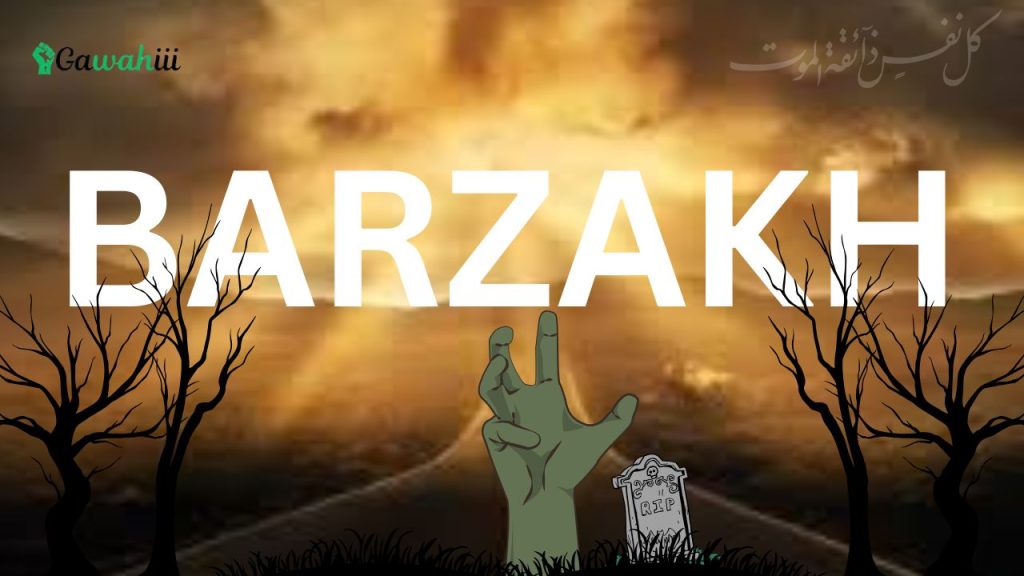Introduction
Barzakh is a very significant term in the context of Islamic theology. Mentioned frequently in religious books and sermons, it causes wonder and reflections in both Muslims and non-Muslims. But what is Barzakh, and more so in the Urdu language, where most people want to get a deeper spiritual meaning?
Barzakh (برزخ) is more than a theological term—it is a stage that is very important in the journey of all humans after death. In Urdu, it is usually understood as حائل (barrier) or درمیانی حالت (intermediate state) between life and the Day of Judgment. The study of this concept can bring comfort, understanding, and ease to eschatology.
This article will discuss the Barzakh meaning in Urdu, the religious aspect of Barzakh, different interpretations of Barzakh, and its importance in the afterlife as the Islamic faith holds. We will also explore Quranic references, the opinion of scholars, and the practical implementation of this great concept in life.
What is Barzakh?—The Islamic Definition
- The term barzakh (Arabic: برزخ) appears in the Quran and Hadith and refers to a separation or division between this world and the next.
- Literal Meaning In Arabic, Barzakh translates to “barrier” or “partition.”
- Urdu Translation: In Urdu, it is interpreted as درمیانی پردہ (intermediate veil) or وقفہ (interval).
Key Facts:
- Referenced in the Qur’an (Surah Al-Mu’minun,23:100).
- Gives an account of the condition between death and resurrection.
- It is viewed as a temporary place that the souls inhabit.
Significance:
- Barzakh is neither heaven nor hell but a place of waiting.
- Depending on the good or bad things that they do on earth, souls either rest in peace or get punished.
- This belief aids Muslims in comprehending the need to be ready in the Hereafter by leading a righteous life in this world.
Quran and Hadith Barzakh
Barzakh has a strong theological background, as it is anchored in some of the most important sources of Islam.
Quranic Verses:
Quran 23:100 Surah Al-Mu’minun:
And between them and Him is a barrier (Barzakh) until the day they are resurrected.
Quran 55:20, Surah Ar-Rahman:
There exists between them a barrier (Barzakh) that they do not cross.
Hadith References:
- Prophet Muhammad ﷺ quoted:
- “The Hereafter is originally the grave. (Tirmidhi)
- In another hadith, Barzakh is expressed as the world wherein the soul either rests comfortably or is in torment until the Judgment Day.
Key Interpretations:
- The experts are alike in that Barzakh is a non-corporeal state.
- It is an embodiment of the actions of an individual in metaphysical repercussions, not wholly in paradise or hell.
Barzakh Urdu Meaning: Linguistic and Cultural Explanation
The Urdu interpretation of Barzakh is not literal. It has a cultural and emotional attachment to most Urdu-speaking Muslims.
Usual Urdu Translation:
- حائل—A screen or divide
- وقفہ—A stoppage or intermission
- درمیانی حالت—Betwixt andbetween state
Cultural Understanding:
- Of frequent occurrence in funeral discourses (جنازہ).
- Connected with the soul’s travel after death.
- Urdu literature and Sufi poetry describe it poetically.
Uses of Urdu in a practical way:
- “روح برزخ میں وذاؤ گئی ہے.” ” – The soul has ascended Barzakh.
- The Barzakh برزخ کا عذاب – Torment in Barzakh of the wrongdoers.
Barzakh Life: Life after Death
According to Islamic teachings, Barzakh is the actual, though invisible, world in which all the souls are waiting to be resurrected.
What Occurs in Barzakh:
- The dead are interrogated by angels Munkar and Nakir.
- The grave turns into a Jannaha garden or Jahannam pit.
- Depending on their actions, souls know where they will end up.
About the case Righteous:
- They are exposed to peace and light.
- Their graves are enlarged and perfumed with the smell of paradise.
In the case of Sinners:
- They are subjected to cramped conditions, a lack of light, and punishment.
- They seek forgiveness, yet they have to await Qiyamah.
The Perspective of Scholars on Barzakh
Barzakh has been expounded upon by Islamic scholars throughout the centuries, based on the Qur’an and Hadith.
Classical Scholars:
- Imam Ghazali perceived Barzakh as the place where the soul is cleansed to get ready for its permanent residence.
- Ibn Qayyim: Barzakh was declared as a glimpse of the Hereafter by Ibn Qayyim, which strengthens accountability.
Modern Scholars:
- Stress that Barzakh is not a symbolic reality.
- Promote thinking about death and moral responsibility.
Shared Themes:
- Barzakh is punishment and reward.
- It serves as a reminder to the Muslims that death is not the end but a change.
Barzakh and Grave Punishment: Aren’t they the same?
Barzakh and the idea of punishment in the grave (عذاب قبر) are usually mentioned in one breath, yet they are not completely interchangeable.
Concept: Barzakh Grave Punishment
- Definition: The interim between death & Qiyamah, torture or repose in the grave
- Length Until the Day of Resurrection: A part of the Barzakh experience
- Scope Coverage of Soul Journey, Dreams, and Visions Concentrated on the Physical/Spiritual Grave
Quranic Mention: Yes (Surah Mu
Summary:
- Barzakh has a subset called grave punishment.
- All souls in Barzakh will either be punished or not based on their actions.
- Why Deciphering Barzakh Alters Our Way of Life and Death
- The concept of Barzakh is not merely theological—it determines the way Muslims live, die, and grieve.
- Spiritual and Emotional Merits of Being Acquainted with Barzakh
- Death reality keeps the idea alive in mind and heart (موت کی بھوت میں ڈالتا ہے).
- Fosteres bildinga på ärlig ånger.
- Assures bereaved persons that they will see their loved ones again.
Practical Impact:
- Affects Islamic deeds for the janazah and du’a.
- Predisposes the attitudes to the Hereafter and accountability.
- Encourages charitable deeds and praying to the dead relatives.
References to Barzakh in Poetry & the Mystical
Barzakh is a popular topic of poetry and Sufi and Islamic mysticism.
By Sufi Thought:
- Barzakh is a purification place.
- It is perceived as a place where the soul contemplates and makes a voyage to God.
In URDU POETRY:
- Spiritual metaphors of Barzakh were cited by Mirza Ghalib, Iqbal, and others.
- It has been termed as a veil between longing and reunion.
Examples:
- ح_BC clones_2109.png برزخ میں وصال کی امید ہے۔ope of union in Barzakh.
- ”برزخ کی پرت ہٹے گی ہی کیوں نہ….” – Will thee Barzakh veil ever be removed?
Awry Beliefs concerning Barzakh
Barzakh has several myths and misconceptions despite its explicit biblical basis.
Common Myths:
- Barzakh is exclusively for the sinners—false. All people go into Barzakh.
- That is just a dream, only false. It is an actual metaphysical condition.
- Souls can talk to each other. The fact that souls can communicate (at least to some degree) is not universally accepted (by scholars), although some of them do accept it (such as in the case of dreams).
Clarifications:
- Barzakh is not purgatory, as in the Christian doctrine.
- It belongs to the Islamic perception of time and space that is not within our comprehension.
How to Prepare for after Death—rzakh
It is part of Islamic spiritual life to prepare oneself for Barzakh.
Actionable Steps:
- Salah parwan charh karey.
- Recite Gurreh and Astighfar.
- Do charity (صدقہ جاریہ) with the long-term reward in mind.
- Keep a nice character and intention.
Prophet Muhammad ﷺ narrated:
“The grave is either a Paradise garden or a Hellll pit.”
Barzakh preparation entails making our souls rest in gardens.
FAQs about Barzakh Meaning in Urdu
How long does one have to stay in Barzakh?
Answer from Death till the Day of Reckoning. The time frame is different for every individual, but it consists of centuries or even millennia.
Can they meet in Barzakh?
Answer: Certain scholars reckon that righteous souls can identify one another, but communication is restricted as in the worldly sense.
Is Barzakh qualified in the Qur’an?
Yes, especially in Surah Al-Mu’minun (23:100) and Surah Ar-Rahman (55:20).
Conclusion
Tajarub Ke Barzakh, meaning “experience of the Barzakh” in Urdu, is a spiritual insight into the Islamic rigor after death. It is not only a theological conceptuality but an actual condition that the souls are expecting. Based on Quranic references, Hadiths, and the ideas of scholars, we get to know that Barzakh is a place of waiting, self-review, and preview of the eternal life ahead.
We can prepare for Barzakh by living a righteous life, remembering death, and ensuring that our actions are in accordance with the teachings of Islam so that we can meet it with hope rather than fear. May the wisdom of Barzakh enable you to lead a conscious life, engage in compassionate actions, and endeavor to spend the afterlife in the mercy of God.
References:
- Qur’an: Surah Al-Mu’minun (23:100), Surah Ar-Rahman (55:20)
- Sahih al-Bukhari & Tirmidhi collections
- Imam Ghazali, Ibn Qayyim al-Jawziyyah
- “Islamic Eschatology” by Dr. Yasir Qadhi
- Also read this?
- part







